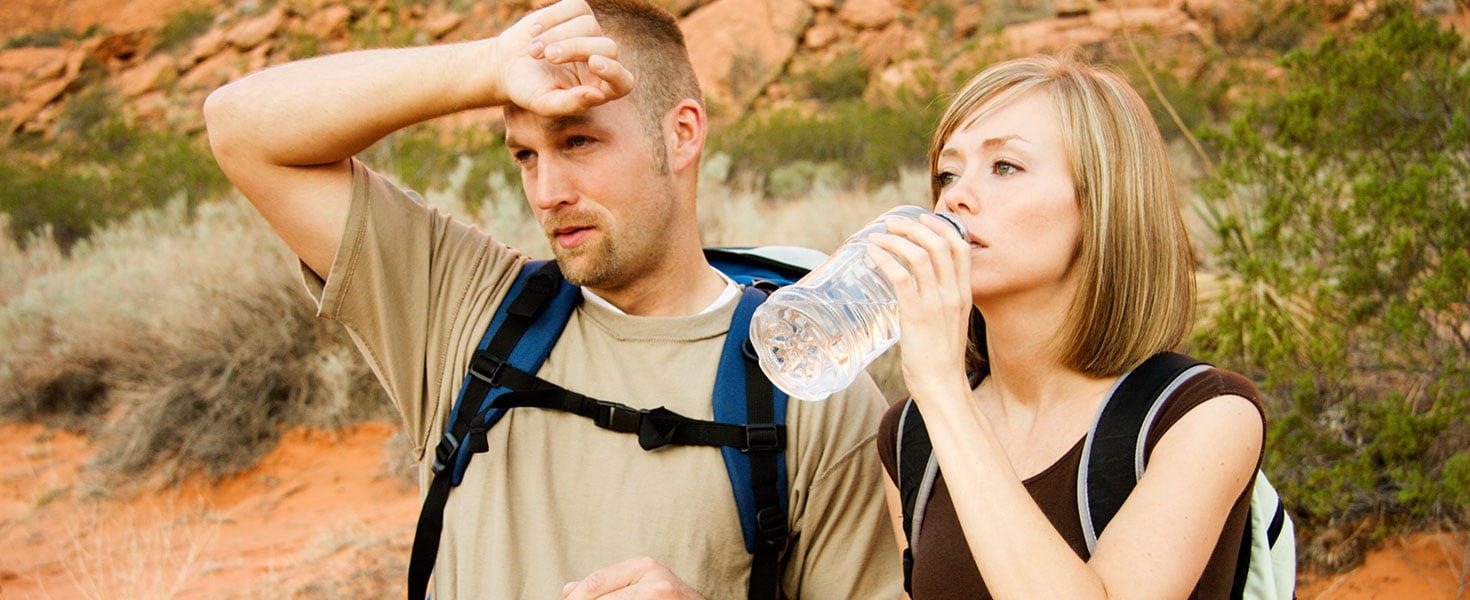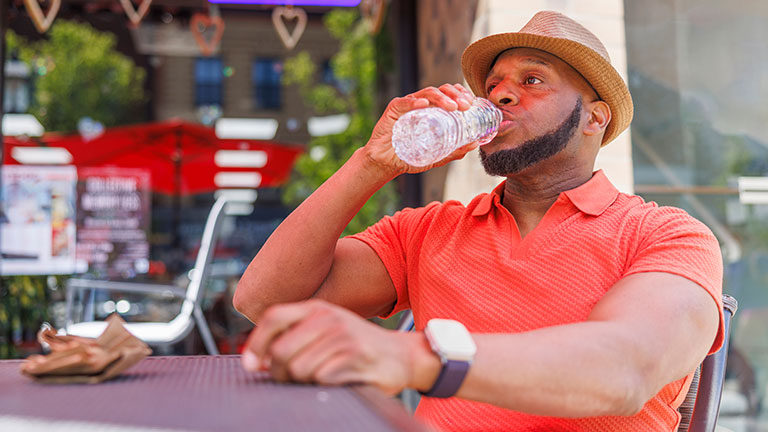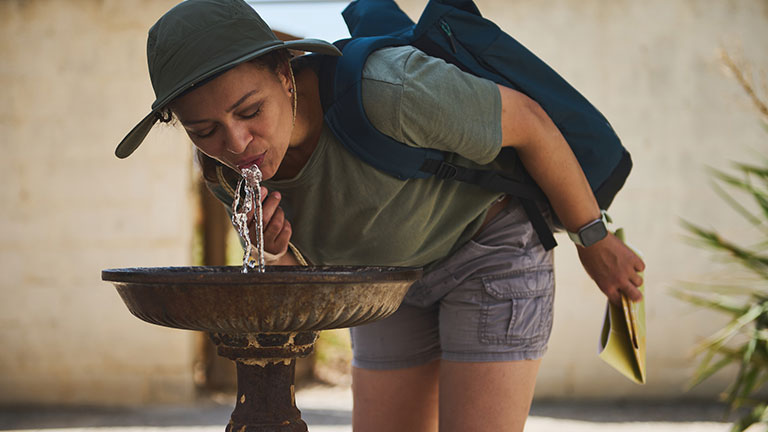How to Prevent Dehydration While Traveling
Our writer and seasoned traveler shares tips on how to stay hydrated after learning these lessons the hard way

I have been severely dehydrated three times. In all instances, the condition occurred during trips involving long flights and exposure to high temperatures. The first time was in Beijing. The day after taking a 17-hour flight, I climbed the Great Wall in 95-degree heat. On Day 2, I entered the expansive, sun-scorched Forbidden City at high noon. I hadn’t been hydrating much, as Beijing’s tap water was questionable and public toilets were scarce. Inside the Forbidden City, with no drinks allowed or sold, thirst hit hard.
Within 20 minutes, my heart raced, I went pale, and my mouth dried up. Dizzy, I collapsed in the shade. I could sense the situation was serious—really serious. I told the tour guide I needed to go to a hospital. She found a wheelchair, and I was rolled out of the Forbidden City, zigzagging through crowds, rickshaws, and bicyclists. A cab finally got me to an international clinic, where I was put on an IV and kept overnight. The next morning, an English-speaking doctor told me that I had been on the verge of a heat stroke—severely dehydrated and low on both water and electrolytes, minerals essential for the body to function.
My travels had all the makings of a dehydration health disaster. Long flight? Check. Intense exercise upon arrival? Check. Heat and poor air quality? Check. Not enough water? Checkmate. My experience is a cautionary tale; it taught me, the hard way, how I should prepare to prevent dehydration while traveling.

Why does dehydration happen?
Simply put, our bodies need fluids to function properly. “All organ systems—the brain, kidneys, muscles, vascular system, and the skin—benefit from being well-hydrated,” says Dr. Kenneth Koncilja, who practices internal medicine and geriatrics at the Cleveland Clinic.
When your body loses more fluid than it takes in—through sweating, illness, heat, or simply not drinking enough—dehydration can result.
Common signs of dehydration include the following:
- Dizziness
- Headache
- Fatigue
- Nausea
- Muscle cramps
- High heart rate
- Low blood pressure
- Confusion
If you experience any of these symptoms, stop activity immediately, and hydrate right away, ideally with fluids that contain electrolytes, such as Gatorade or coconut water. Should your symptoms worsen or fail to improve, it may be time to head to the hospital, where IV fluids and blood tests may be necessary to restore balance and check for further issues. Left untreated, dehydration can lead to serious and potentially life-threatening complications.

What makes travelers prone to dehydration?
If you've ever stepped off a plane feeling dried out or exhausted, you're not imagining it; travel can increase your risk of dehydration.
One major factor is the dry air in airplane cabins. Dr. Marcus Coplin, a naturopathic medical doctor, explains that the air on planes is intentionally kept at low humidity levels to prevent the spread of germs. However, this also means you lose more moisture than usual just by breathing. The dry environment pulls water from your mouth, nose, lungs, and skin.
Travel-related stress also plays a role. When you're navigating airports, dealing with delays, or just feeling tense about flying, your body reacts by releasing stress hormones, which can throw off its natural fluid balance.
“Stress hormones can interfere with the body's natural regulation of fluids,” Dr. Coplin says, “meaning that you will need to increase water intake to keep at a normal state of hydration.”
Another factor? Jet lag. According to the National Institutes of Health, disruptions to your circadian rhythm (your internal clock) can affect gastrointestinal function, making it harder for your body to absorb fluids properly.

How to prevent dehydration while traveling
Dehydration is a common risk in daily life, but travel makes it even more likely. While heat and heavy sweating are typical culprits, dehydration can also strike in cold weather, particularly on trips involving high altitudes, sun, and physical activity (think skiing).
The good news is that dehydration is usually preventable. It starts by beginning the hydration process ahead of a trip and continuing proper liquid intake throughout.
Avoid the fate that befell me by following this advice:
- Hydrate, hydrate, hydrate.
Start increasing your fluid intake before a trip, advises Dr. Teresa Lovins, a board member of the American Academy of Family Physicians. She recommends drinking 20 to 32 ounces of fluids (roughly 2.5 to 4 cups) every four to five hours the day before and the day of travel.
To combat the dry air on airplanes, Dr. Lovins suggests sipping 8 ounces (one cup) of water every hour, alternating with electrolyte-filled fluids. It’s also smart to avoid diuretics such as coffee and alcohol while flying. Once you arrive, keep sipping water regularly.
- Drink your electrolytes.
Water alone isn’t enough; your body needs a balance of electrolytes to keep cells, muscles, and organs working properly. Too much plain water without electrolytes can dilute mineral levels in your body, as my attending doctor in China warned me. That’s why it’s important to alternate plain water with fluids containing salt and other electrolytes. Drinks such as Gatorade, coconut water, and pickle juice can help.
When those aren’t available, pack electrolyte powders that dissolve in water. Just steer clear of electrolyte mixes loaded with sugar or artificial sweeteners.
- Monitor your urine color.
A simple way to track hydration is by checking the color of your urine. Pale yellow usually means you’re well hydrated, while darker shades may signal the need for more fluids.
- Rest upon arrival.
Give your body time to recover. Avoid strenuous activities for at least the first 24 hours after landing to let your body adjust.

- Choose your food carefully.
Snack on foods with high water content. Dr. Koncilja recommends fruits, vegetables, cottage cheese, and yogurt. Bananas, avocados, dried apricots, and spinach are especially rich in vital electrolytes such as calcium, potassium, and magnesium.
Dr. Lovins advises avoiding dry foods such as meat and bread, which can pull extra water from your system.
- Replenish regularly.
Always travel with a water bottle and electrolyte tablets—or have oral rehydration kits on hand. Remember healthy snacks to keep your energy up and hydration balanced.
- Check with your doctor.
Before a long trip, consult your healthcare provider about any conditions or medications that might increase your risk of dehydration.
- Consider travel insurance.
Travel insurance can help cover medical expenses abroad if dehydration—or another health issue—strikes during your travels.
The moral of the story: Prepare, drink up, and stay cognizant of early symptoms of dehydration when traveling. After all, as my experience shows, the best preparation doesn’t always leave you immune from the scourge of dehydration.
